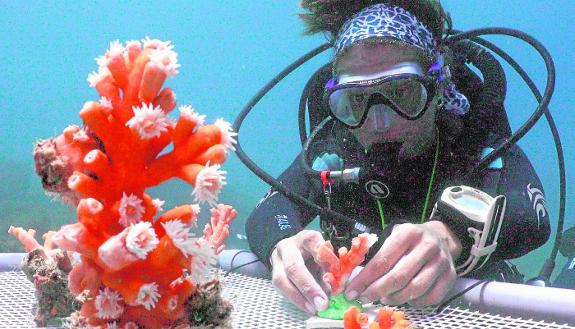Volunteers dive in to clean up the local sea bed and save the delicate coral
The divers are removing rubbish, including fishing lines which are hooked on the coral, in areas such as Maro and Cerro Gordo
IGNACIO LILLO
Viernes, 4 de septiembre 2020, 12:57
Many people do not realise, but there is coral on the sea bed off the Malaga coast, and some of the best-preserved examples can be found at Maro-Cerro Gordo and also at Punta de la Mona, in Granada province. For scientists these are very important animals - not plants - because they are bio-indicators of the state of conservation and climate change. "In the Mediterranean they are vital for the ecosystem. The fish use them as a refuge and to lay their eggs; without corals, there wouldn't be other species," says Fernando García Alarcón, president of the Equilibrio Marino association, which has set up the SOS Corales programme.
"They are under threat; the conditions of this population have been gradually deteriorating," says Fernando, and for this reason the association is drawing up a marine recuperation plan, especially in the area between the provinces of Malaga and Granada. It has taken them two years to obtain the necessary permits. They use the Promaris Uno boat, thanks to a collaboration with the Alnasur company. It has all the equipment necessary to retrieve the rubbish collected by the divers. They also have an agreement with Marina del Este port, where they can berth, and funding from the European Mediterranean Marine Protected Area association (MedPan); the Coral Guardian and several collaborating companies.
The team of about 20 volunteers, all expert divers with scientific knowledge, works at weekends to remove the rubbish which is affecting the ecosystem of the corals. "This is not normal cleaning of the sea bed, it is marine recuperation because the area is full of corals and protected species," says Fernando García Alarcón. They have to work with extreme care to avoid causing damage. "It's almost like being a surgeon," he says. They also often find fishing traps and lines stuck on the coral, as well as other rubbish. "It's very detailed work and sometimes very time-consuming, but it gives incredible results."
An added difficulty is that corals such as 'Dendrophyllia ramea' start to appear at a depth of 30 to 50 metres, so the divers have to be experienced and work in a coordinated and well-planned fashion.
The final aim is for the Maro, Cerro Gordo and Punta de la Mona areas to become a Protected Marine Area, where fishing cannot take place, and to create a precedent for similar areas. The regional government is already working on draft regulations, and these should be ready within a few months.
